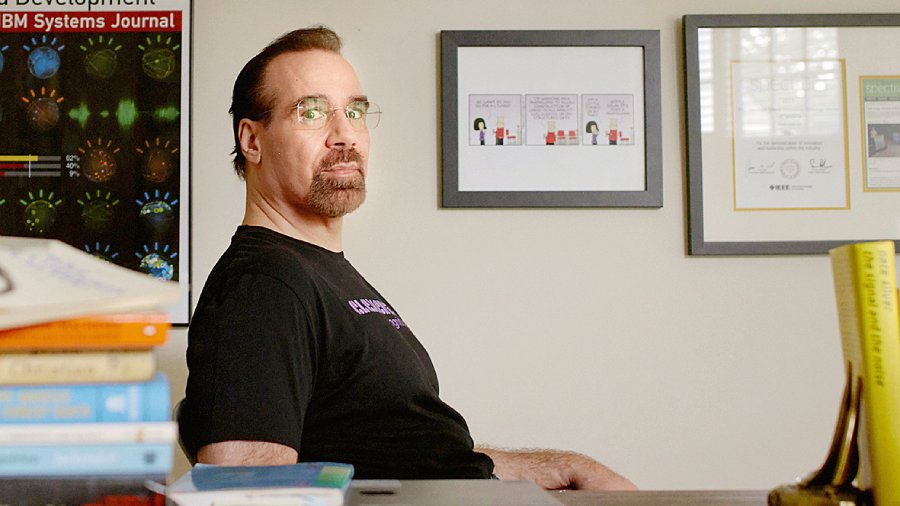David Ferrucci, who led the team that built IBM’s famed Watson computer, was elated when it beat the best-ever human “Jeopardy!” players in 2011, in a televised triumph for artificial intelligence.
But Ferrucci understood Watson’s limitations. The system could mine oceans of text, identify word patterns and predict likely answers at lightning speed. Yet the technology had no semblance of understanding, no human-style common sense, no path of reasoning to explain why it reached a decision.
Eleven years later, despite enormous advances, the world’s most powerful AI systems still have those limitations.
Today, Ferrucci is the CEO of Elemental Cognition, a start-up that seeks to address AI’s shortcomings. “To me, the Watson project was always a small part of a bigger story of where we want to go with AI,” he said.
The ultimate goal, in Ferrucci’s view, is that AI becomes a trusted “thought partner”, a skilled collaborator at work and at home, making suggestions and explaining them.
Elemental Cognition, founded in 2015, is taking measured steps toward that goal with a promising, though unproven, hybrid approach. Its system combines the latest developments in machine learning with a page from AI’s past: software modelled on human reasoning.
Newer machine-learning programs are remarkable at pattern recognition and predictions, far more powerful than in the “Jeopardy!” days. They pore over millions of words and word patterns, and generate the most likely interpretations. Elemental Cognition is building on that progress, taking machine-learning-generated predictions and feeding them into software that is designed to produce causeand-effect inferences that are explicable to humans.
The results, ideally, are answers or recommendations that not only are accurate but also follow a step-by-step logic and reflect the equivalent of common sense. Earlier versions of this sort of software were limited and brittle, requiring constant updates that had to be coded by hand. Elemental Cognition’s hybrid system eliminates most, though not all, of the handcrafting.
“It’s a tremendous saving in time,” said Aditya Kalyanpur, director of AI research at the startup.

David Ferrucci of the New York-based Elemental Cognition that seeks to address AI’s shortcomings NYTNS
The big, so-called deep learning programs have conquered tasks such as image and speech recognition, and new versions can even pen speeches, write computer programs and have conversations.
The programs are also deeply flawed. They can generate biased or toxic screeds against women, minorities and others. Or occasionally stumble on questions that any child could answer. (“Which is heavier, a toaster or a pencil? A pencil is heavier.”)
“The depth of the pattern matching is exceptional, but that’s what it is,” said Kristian Hammond, an AI researcher at Northwestern University in the US. “It’s not reasoning.”
Elemental Cognition is trying to address that gap.
Others are working on the reasoning and common sense challenge in AI, including leaders of the machine-learning field. But experts are impressed by Elemental Cognition’s practical technology and, if successful, they say it could be applied in many industries.
It’s good engineering,” said Andrew Hickl, a managing director and AI expert at Accenture, a large technology consulting firm. “And I do think the best systems in the future will be those that take a hybrid approach.”
It is too soon, outside AI experts say, to know whether Elemental Cognition’s hybrid approach could be broadly and economically applied.
“It’s an early, innovative effort that is countercultural in AI at the moment” because so much recent progress in AI has come from machine learning, said Oren Etzioni, CEO of the Allen Institute for Artificial Intelligence in the US.
Elemental Cognition’s workforce has grown steadily to 46. Its proofof-concept projects have been effective recruiting tools. Shirin Saleem joined the start-up last year from Amazon, where she was a research manager developing AI for Alexa, the company’s virtual assistant.
In Elemental Cognition’s recruiting pitch, Saleem was particularly impressed by its AI being used to help customers plan and book round-the-world airline tickets. “I thought, ‘Here’s the power of the hybrid approach,’ ” she recalled.
The round-the-world ticket is a project for Oneworld, an alliance of 13 airlines including American Airlines, British Airways, Qantas, Cathay Pacific and Japan Airlines. Its roundthe-world tickets can have up to 16 different flights with stops of varying lengths over the course of a year.
Elemental Cognition supplies the technology behind a trip-planning intelligent agent on Oneworld’s website.
The user sees a global route map on the left and a chatbot dialogue begins on the right. A traveller starting from New York types in the desired locations — say, London, Rome and Tokyo. “OK,” replies the chatbot, “I have added London, Rome and Tokyo to the itinerary.”
Then, the customer wants to make changes — “add Paris before London” and “replace Rome with Berlin”. That goes smoothly, too, before the system moves on to travel times and lengths of stays in each city.
Ferrucci concedes that advanced machine learning — the dominant path pursued by the big tech companies and well-funded research centres — may one day overcome its shortcomings. But he is sceptical from an engineering perspective. Those systems, he said, are not made with the goals of transparency and generating rational decisions that can be explained.
“The big question is how do we design the AI we want,” Ferrucci said. “I think we need to step out of the machine-learning box.”
NYTNS











